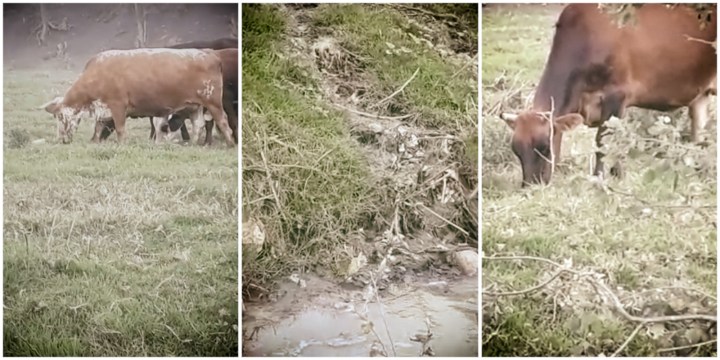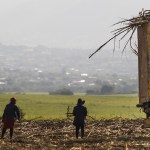PUBLIC HEALTH CRISIS
Makana Municipality’s sewage has been running into rivers and streams since 2014

A dysfunctional wastewater treatment plant in Makana Municipality is polluting rivers and streams in Makhanda in the Eastern Cape. The mayor says there’s no money to repair the facility.
Residents and livestock at Makana Municipality in the Eastern Cape face a health crisis as raw sewage overflows into the rivers and streams in Makhanda, formerly known as Grahamstown.
Makhanda resident Helen Holleman said she never understood why the council made such a fuss about Covid instead of panicking about cholera, dysentery and hepatitis.
“Trying to get an official out of his or her office to walk the watercourses and smell the smells is almost impossible. And goodness knows where the person in charge of the monthly water report hides the information,” said Holleman.
She said sewage flows into the river that runs through built-up areas where kids paddle and dogs drink.
“What we have here is a systemic problem with many nodes. Some of them have been fixed, but they soon bubble up again because people don’t understand … and because the actual system seems to be a hodgepodge of systems,” said Holleman.
She said she has seen children playing in the polluted water and recently saw an overflowing sewer near a school, with cows wandering through it and drinking the water.
According to DA councillor and Makhanda resident Cary Clark, tests have revealed dangerous E. coli levels in certain sections of local rivers.
“Residents of this municipality are facing a dire health crisis due to the municipality’s inability to deal with raw sewage flowing into the rivers,” she said.
Clark said they recently conducted oversight inspections at seven sites along the Kowie, Blaauwkrantz and Mtayane rivers to determine contamination levels.
“We then took samples and sent those off to Rhodes University in Makhanda to be examined by an independent expert. The testing revealed that E. coli counts posing a definite danger to the health of residents were found at five of the seven sites.
“E. coli levels should be close to zero … anything above 100 colony-forming units (CFU) per 100ml is dangerous to humans and animals alike,” she said, adding that at the five contaminated sites, E. coli counts of 280, 1,000, 1,800 and 30,000 were found.
“This is an environmental and economic catastrophe waiting to happen. The discharge of sewage into rivers could result in the water becoming so contaminated that it will no longer be fit for use as an irrigation source for farmers.
“The discharge of raw sewage into a natural water resource is also illegal in terms of the Constitution, the National Environmental Management Act and the National Water Act.”
Clark said the sewage spills were the direct result of the Belmont Valley Wastewater Treatment Works (WWTW) being unable to cope with the sheer volume of sewage flowing through it.
“Belmont Valley requires a huge refurbishment, and although there are plans for some work to be done, it falls far short of what is needed to make Belmont Valley compliant,” she said.
Visit Daily Maverick’s home page for more news, analysis and investigations
Former Cooperative Governance MEC Xolile Nqatha, responding to a question from the DA about the WWTW in Makhanda, said it would take R230-million to refurbish the infrastructure.
Nqatha said the facility was built in 1969 and there had been no upgrades since the plant came under the custodianship of Makana Municipality.
“Only routine maintenance and refurbishments have occurred. There are four non-functioning biofilters (three have collapsed and one with a rotating arm is not functional), the digester is not functional, the disinfection room is completely vandalised and is not functional,” he said.
Makana Municipality’s executive mayor, Yandiswa Vara, said she was disappointed with the DA’s Clark for criticising the municipality.
“The information she is bringing is known, as it has been continuously reported to the portfolio committee: engineering and infrastructural services, mayoral committee and council. This has even been reported to relevant sector departments.
“In the recent past, the portfolio committee of the national Department of Cooperative Governance has even been taken to the discharge point, to witness the impact of overcapacity on the water courses,” she said.
“Our potable water comes from the Glen Melville, Howiesons Poort and Settlers dams. It is then purified for drinking purposes at our water treatment plants. The dams that have been mentioned by Clark are linked to the discharge point of wastewater effluent coming from Belmont Valley Wastewater Treatment Works.
“This is unfortunately an issue that Makana Municipality requires a major capital injection, financially, to deal with. However, spillages from the Belmont Valley WWTW do not affect the community of Makhanda, but communities downstream, including sources of Ndlambe municipality,” she said.
Vara said the Makana municipality is continuously engaging with relevant stakeholders to deal with the situation.
“In the business plan of 2022/23 financial year, there are plans to kickstart refurbishments/upgrades, with the limited funding … that has been R31-million, which will assist us to do Phase 1, to ensure that the minimal treatment is taking place, whilst awaiting for a long-term solution,” said Vara.
Clark said she was not referring to potable water or dams.
“It is my responsibility to look after the people in my ward and by extension the greater community. I feel people need to be warned of high E. coli counts in our streams … these streams feed into the Kowie, so the mayor is out of touch if she thinks it does not affect the people of Makana,” she said.
Clark said raw sewage spills all over Makana are feeding into streams, which they report, but nothing is done about it.
“People who live next to the river will attest to this. Cattle drink it, people cross over it and people who live next to it have to endure it daily.
“I have been religiously monitoring our drinking water in Makana and I’m happy to say that it is safe to drink … I have asked on numerous occasions for the results to be published on the website, but to my knowledge this has not happened. I will make sure the public are informed as soon as possible should water become dangerous to drink,” she said.
Clark said Belmont Valley WWTW had been dysfunctional since 2014, with no major interventions to refurbish it.
“The money set aside for the WWTW is nowhere near enough to make the plant compliant. The municipality historically is at fault for not maintaining the infrastructure and it is up to this council and municipality to work as a team to rectify the damage.
“It is not possible for us to fund this on our own, but neither can we wait another eight years and hope things will come right. By highlighting the problem, I hope it will get escalated so that funds are found at a national level,” she said. DM/OBP



















It not only disappointing, but darnright frightening when the mayor says she is disappointed for being critisized by the DA. Innocent children and animals aside, its difficult to feel sorry for the people of Grahamstown who consistantly vote to live knee deep in thier own sewage.